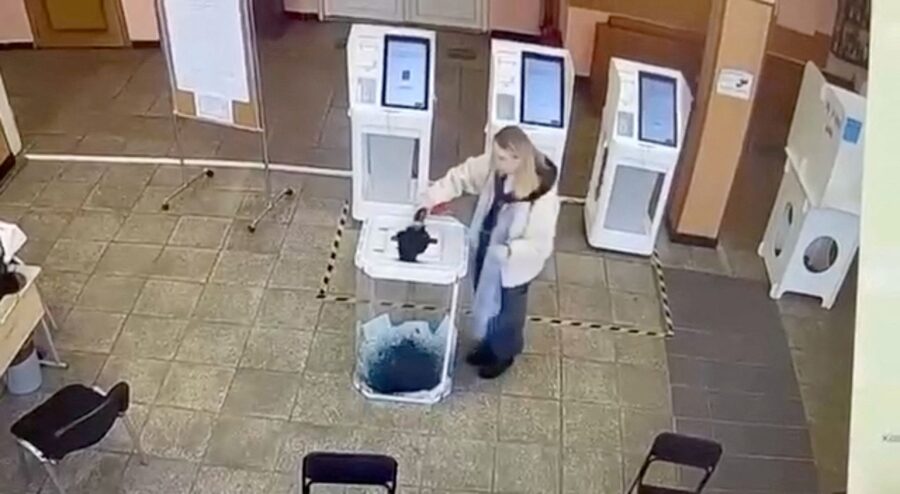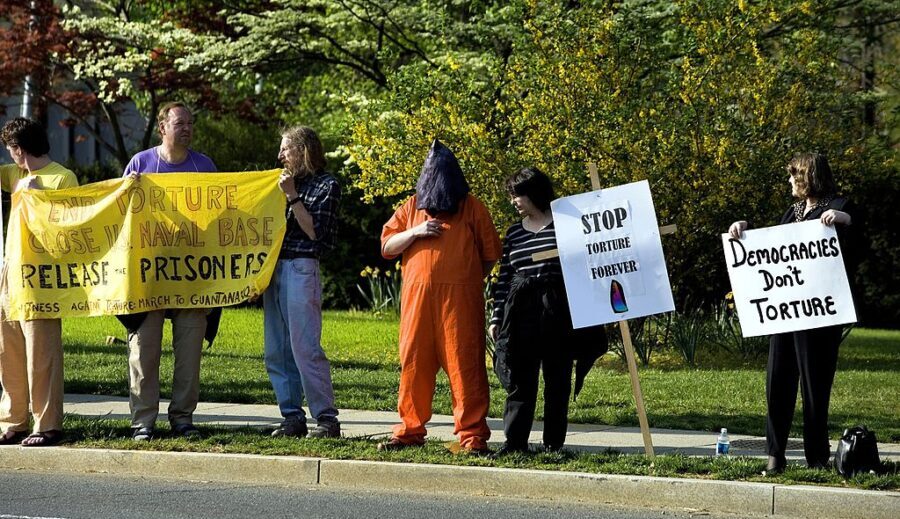Russia opens criminal cases after protesters pour dye in ballot boxes, start fires with voting underway
Mar 16, 2024, 4:18 PM

A woman pours liquid into a ballot box during the Russian presidential election in Moscow, Russia, March 15. (Reuters, via CNN Newsource)
(Reuters, via CNN Newsource)
(CNN) — Russia has filed at least 15 criminal cases after people poured dye in ballot boxes, started fires or lobbed Molotov cocktails as small acts of civil disobedience marred the presidential vote.
Dissent has effectively been outlawed in Russia since it launched its invasion of Ukraine more than two years ago.
In total, 29 polling stations across 20 regions in Russia have been targeted by “narrow-minded people,” said the head of the Electoral Commission, Ella Pamfilova, according to Russian state news agency Tass.
Eight attempts of arson had been recorded during the election, and 214 ballot boxes had been irretrievably damaged, Pamfilova added.
The cases are being filed under the article on “obstruction of the work of election commissions.”
Pamfilova later said individuals detained for damaging ballots will be checked for Ukrainian connections.
She added that some of those detained for damaging ballot boxes at polling stations had told investigators they had acted for money from abroad and did not know they would be held criminally responsible.
According to Pamfilova, one of the detainees was promised 100,000 rubles ($1,081) to disrupt voting. She also claimed that Russian voters had been messaged from phone numbers in Ukraine and “European countries” with instructions to spoil ballots, saying they had been coerced into carrying out the attacks, with legal and financial pressure.
Pamfilova did not provide evidence or specify which European countries the phone numbers were from.
Numerous incidents
Several incidents were reported across Russia on Saturday, including a resident of Ivanovo, who set fire to a ballot box at a polling station, according to the regional department.
In Yekaterinburg, a man has been detained for 15 days for hooliganism for attempting to pour paint into a ballot box, Russian state media RIA Novosti reported. A woman, who is a university professor in the city, was also arrested for 15 days for smuggling green paint into a polling station, state media TASS reported.
OVD-Info, an independent Russian human rights group that monitors Russian repression, reported that a young man, who “wrote the word ‘boycott’ in the voter list manual and tried to carry the ballot given to him away,” was detained in Odintsovo, a city that borders Moscow.
OVD-Info also reported that another Moscow-area resident, Maria Alekseeva, was detained “because of a certain inscription on the ballot.”
Alekseeva’s lawyer, Alan Kachmazov told OVD-Info that “a protocol to discredit the army was drawn up” against her and the police “is planning to take her to court.”
This follows similar incidents caught on camera on the opening day of the three-day vote, which is nearly certain to extend Vladimir Putin’s long grip on power.
CCTV video from a polling station in Moscow showed a young woman pouring what appeared to be green dye into a ballot box. She was immediately detained, according to RIA Novosti.
In St. Petersburg, Putin’s hometown, a woman threw a Molotov cocktail at the signboard of a polling station in the Moskovsky district, RIA reported. The fire was quickly extinguished and there were no injuries, officials said.
An expected victory for Putin
Polls opened Friday across Russia’s 11 time zones. With most opposition candidates either dead, jailed, exiled, barred from running or simply token figures, Putin is expected to coast to victory, extending his rule until at least 2030.
The turnout on the second day of voting as of 12 p.m. ET was 52%, according to the Central Election Commission of Russia.
While the result of the election is not in doubt, it is important to the Kremlin that the ritual runs smoothly with scant displays of dissent.
“Considering the synchronicity of incidents in different regions, one can assume a deliberate organized provocation,” Alena Bulgakova, chair of the Russian Civic Chamber, said Friday according to Ria Novosti.
Pamfilova earlier called the protesters “scum,” and claimed without evidence that several of those who poured liquid into ballot boxes were paid to do so.
The Russian government often alleges that acts of political dissent are paid-for “provocations” rather than genuine acts of protest.
Green dye has been used in attacks on Russian journalists and opposition figures, most notably on the late Kremlin critic Alexey Navalny, Putin’s most formidable opponent.
After staging huge anti-government protests in 2017, Navalny was splashed with antiseptic green dye in an attack that damaged his vision in his left eye.
Navalny died in an Arctic prison a month ago. Russia’s prison service said he “felt unwell after a walk” and lost consciousness, later attributing his death to natural causes. The Kremlin denied any involvement in his death.
Navalny’s widow, Yulia Navalnaya, has called on Russians to protest the “fake” presidential election and turn out collectively on the final day of voting on Sunday at noon as a show of opposition.













